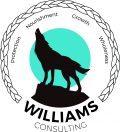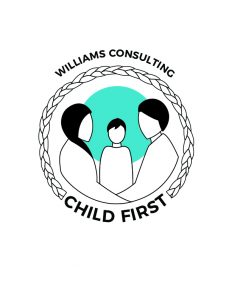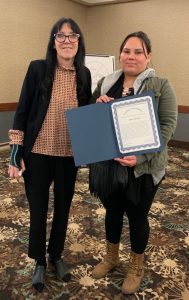Jordan’s Principle Child First Services:
Williams Consulting and its team members have more than 20 years experience and expertise in delivering Indigenous 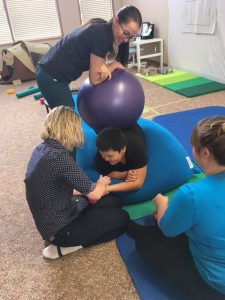 designed and led, child centered, culturally safe, family-based techniques with First Nation children with special needs and their families.
designed and led, child centered, culturally safe, family-based techniques with First Nation children with special needs and their families.
Utilizing an Indigenous culturally safe and family-fased approach to development combined with additional strategies, Williams Consulting offered two types of services:
1. Training and Capacity Development for First Nations implementing Jordan’s Principle programming
The team will empower communities to implement special needs programming with their Jordan’s Principle funding with 0-12 years. The Team will provide the community with preliminary assessments, care plans, an activity/strategy manual for each child, staff and parent training. This includes:
- A strong focus on staff training on strategies ;
- Staff training – introduction to the process, what is a Care Plan, general intervention strategies, things to expect.
Over the course of additional site visits we continue to:
- Supply and educate on the children’s Care Plans.
- Add new strategies to the children’s manuals.
- Staff training – how to implement the Care Plans, teaching/behavioral strategies
- Parent training – further information about their child and the program
- Provide and train on visual support packages
- Assist in developing the intervention program by conducting intervention activities together with the Program Staff and parents
- Follow up with parents and Program Staff on all children’s Care Plans and activity/strategy manuals.
- The Year-end reviews where they’ve been and future directions
2. Training and capacity development for individual workers funded by Jordan’s Principle
Williams Consulting has been approached from the design phase (which we tend to leave to the communities) and then to the implementation phase. At this point we may assist with training to help translate vision to practice to enable children and youth to access all available programs and services. It can be challenging trying to form relationships with the families that require support and/or workers may be unfamiliar with all the assessments and tools available for the child.
*********************************************
Project Title: Sisters in Spirit Initiative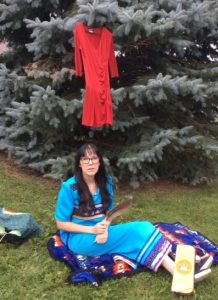
Status of Women Canada and the Native Women’s Association of Canada
This project provides an example of demonstrated knowledge and understanding of research activities that have been identified to provide valid and reliable qualitative and quantitative information to inform a national policy platform. This experience demonstrates the ability to carry out evaluations using the specific methodology/approaches and highlights one example of successful financial management of a previous project.
Date (Month/Year): January 15, 2006 – February 2008
Budget: $300,000.00
Level of Effort: 400 days
Client Name:
Teresa Edwards, B.A., LL.B., A\Senior Policy Analyst
Aboriginal Affairs Status of Women Canada Condition Féminine Canada
Tel: (613) 943-1182
Research Subject Matter:
The purpose of this contract is to assist with the establishment of a five-year research agenda designed to inform a policy and public education campaign aimed at addressing the underlying factors contributing to the sexualized, racialized violence against Aboriginal women. A number of longitudinal research activities have been identified to provide valid and reliable qualitative and quantitative information to inform a national policy platform, including SPSS multivariate analysis and longitudinal analysis. One responsibility of Williams Consulting involved working closely with Status of Women Canada (SWC) in the development of a RMAF and logic model. Williams Consulting also developed the terms of reference for an upcoming management audit and facilitated meetings with Native Women’s Association of Canada (NWAC) senior management for the preparation of the audit.
A natural extension of this initiative has led to a longer-term contract for strategic planning with the organization at the Board of Directors level and providing direction around Native Women’s Association of Canada’s organizational development and design including Human Resource planning and implementation. Williams Consulting is putting in place mechanisms that will enhance and streamline both operational and financial accountability including strategic planning sessions with the Board of Directors and senior management. To date Williams Consulting has developed an 18-month action plan that outlines the mechanism to achieve the strategic plan. Williams Consulting was also responsible for establishing a workshop process to obtain feedback through the facilitation of 35 meetings that will inform the development of a five-year strategic policy plan.
Williams Consulting facilitates meetings with an intergovernmental working group including four federal departments and the National Women’s Association of Canada three times a year to enhance federal engagement in the Sisters in Spirit initiative and influence policy development.
Methodology:
In consultation with the Native Women’s Association of Canada, Williams Consulting has established committees at the Board of Directors level. These committees were developed to mirror the four directional cultural framework of the Sisters in Spirit initiative. A description of the Sisters in Spirit initiative committees and methodology, is as follows:
- Sisters in Spirit Research Plan – NWAC will undertake qualitative and quantitative research on racialized, sexualized violence against Aboriginal women which all too often results in them becoming missing or murdered and on the status of Canadian and international law as it relates to the human rights of Aboriginal women. This component of the initiative falls under the Research and Evaluation Committee of the NWAC Board of Directors, as this committee supports all research and evaluation activities underway at NWAC.
- Sisters in Spirit Education and Awareness – NWAC will implement a national media strategy regarding missing/murdered Aboriginal women. This component of the initiative falls under the Projects Committee of the NWAC Board, as this committee supports all NWAC projects and programs in the achievement of deliverables.
- Sisters in Spirit Policy – NWAC will develop a comprehensive policy strategy for work at both national (federal government) and international levels (United Nations) on issues relating to the human rights of Aboriginal women. The policy strategy must include addressing the underlying factors contributing to racialized, sexualized violence and their socio-economic, political and legal status of Aboriginal women that all too often results in them becoming missing or murdered. This component of the initiative falls under the Policy, Planning and Priorities Committee of the NWAC Board, as this committee supports all policy development for the organization.
- Sisters in Spirit Sustainability and Capacity Development – NWAC will enhance its capacity and other Aboriginal organizations to take concrete actions in response to the Sisters in Spirit initiative and to explore the sustainability of continued work on issues relating to violence against Aboriginal women. The component of the initiative falls under the Corporate Committee of the NWAC Board, as this committee reviews and advises on matters related to the sustainability of current and future work in accordance with the NWAC mandate.
Summary of Core Competencies:
This contract demonstrates Williams Consulting’s ability to work collaboratively with a project authority, conduct strategic planning, develop terms of references for the implementation of committees, integrate the existing cultural framework of the organization into strategic planning, develop facilitation kits, event planning, facilitation, minute taking, provide analysis and synthesis the material into useful evidence based reports and briefing notes.
- Working with Federal government and National Aboriginal Organizations (NAO);
- Working with the Aboriginal community;
- Review of existing programs and background information;
- Key Informant interviews;
- Management coaching and mentoring;
- File, document and literature review;
- Subject matter expertise;
- Report Writing.
|
Project Title: Irish Travellers Sharing the Story Project |
Williams Consulting has been working with INCORE (International Conflict Research, University of Ulster/United Nations University- a centre of peace and conflict studies focused on the transformation from conflict to peace in divided societies) which focuses on strengthening the minority ethnic sector in Northern Ireland (NI). The overall goal of Sharing The Story Project is to develop new approaches to achieving positive change for Irish Travellers – in relation to both community development and public policy. The objectives of the project are to:
- Create space in mainstream society and within Traveller communities to explore new approaches to achieving positive change for Travellers;
- Facilitate a practical exchange of skills, tools and ‘promising practices’ between Travellers and First Nations people;
- Assist Travellers in developing long-term vision(s) of their communities, and identifying how they can move forward to achieve these vision(s);
- Explore the feasibility and implications of a spectrum of mainstream and targeted provision for Travellers, particularly in terms of generating social capital;
- Engage policymakers in an alternative dialogue about achieving positive change for Travellers;
- Support Travellers in leading the development and implementation of new approaches to achieving positive change for their communities; and to
- Build relationships and facilitate more effective communication between Travellers and policymakers.
Williams Consulting team members have been facilitating an exchange between two indigenous marginalized groups, the workshops opened up safe space to explore new approaches to achieving positive change for Travellers. During the workshops, Travellers expressed their interest in programs and services developed by First Nations people for First Nations people, but there was also discussion about whether such programs and services would or could work in the NI/Republic of Ireland (ROI) context.
Williams Consulting team members have spoken at a number of events, meet with relevant policymakers and facilitated six workshops with Traveller organizations and Travellers themselves in Newry, Belfast, Craigavon, Derry/Londonderry and Letterkenny (funded by INCORE projects and Office of the First Minister and Deputy First Minister’s Racial Equality Unit). Andrea Williams is the lead facilitator and undertakes the curriculum development and briefings for this initiative.
|
Project Title: Matrimonial Real Property Solutions On behalf of the Native Women’s Association of Canada and Indian and Northern Affairs Canada |
Date (Month/Year): August 2006 – February 2007
Client Name and Telephone Number:
Sherry Lewis, Executive Director, Native Women’s Association of Canada
Phone: 613 222 1097
Beverley Jacobs, President, Native Women’s Association of Canada
Phone: 613 878 6922
Subject Matter:
The purpose of this contract was to fulfill the federal government’s duty to consult with Aboriginal people regarding Matrimonial Real Property Solutions. Williams Consulting was sub-contracted by the Native Women’s Association of Canada to provide professional services including financial management ($500,000) event planning, minute taking, and report writing on thirteen national consultations. Team members were responsible for Project management, facilitation, logistical coordination, minute taking, analysis, and report writing. Andrea Williams also facilitated meetings between the federal government representatives and the Native Women’s Association of Canada. In addition, she facilitated consultations with the Aboriginal community on this important initiative that is now in the consensus-building stage with the Minister of Indian and Northern Affairs to develop a legislative solution to the issues.
Methodology:
The consultation process utilized Traditional Aboriginal community protocols and social relationships to create a safe place for participants to explore the issues and provide insight into the research agenda. By facilitating a participatory-action oriented process, the Native Women’s Association of Canada enables the voices of women directly impacted by Matrimonial Real Property inequities are represented in the final recommendations.
Local Aboriginal facilitators and Elders were engaged at each session in an effort to respect local Aboriginal community protocols and cultures, and to provide guidance on protocol and open/close the meeting in the culturally appropriate manner for that area. In keeping with general Aboriginal values, a special session entitled “meet and greet” was held the evening before each consultation to provide an opportunity for the consultation participants to establish relationships and share their background and personal interest in this initiative.
The participants in the various consultation activities across Canada were provided with an information package, developed by the Native Women’s Association of Canada, which offered background information on the Consultation process, draft agenda, outlined key issues and provided the four questions that were asked in the consultation activities.
The consultation participants were asked to provide input on four questions to assist in the development of the position paper to the Ministerial Representative of Indian and Northern Affairs Canada with respect to the possible development of legislation to redress inequities. Their responses to these questions will also contribute to the development of a Peoples’ Report to be provided to the participants of the NWAC-led component of this consultation.
It is important to note that this approach for the national consultation was conducted within a tight time frame: the first consultation occurred on October 6, 2006 and the last consultation concluded on December 8, 2006. Williams Consulting produced a draft report for December 20, 2006 in less than two and one-half months. Following this draft report, Williams Consulting then facilitated a feedback loop with the advisory committee and focus groups composed of consultation participants.
Williams Consultation provided event-coordination, minute taking, facilitation, financial management and report writing for the following sessions with a total of 331 people:
- Calgary, Alberta – October 6-7, 2006: (13 attended in total; 8 Participants, 1 Elder, as well as 3 NWAC staff members and 1 INAC representative as observers)
- Yellowknife, Northwest Territories – October 12-13, 2006 (9 attended in total, 4 Participants, 1 Facilitator, 3 NWAC staff members and 1 INAC representative as observers)
- Winnipeg, Manitoba – October 14-15, 2006 (14 attended in total, 6 Participants, 1 Elder, 1 Facilitator, 2 NWAC staff, 1 Technical Advisory Group Member, 2 staff representing Ministerial Representative, 1 INAC Observer)
- Saskatoon, Saskatchewan – October 19-20, 2006 (37 attended in total, 29 Participants, 1 Elder, 1 Facilitator, 3 NWAC, 2 staff representing Ministerial Representative, 1 INAC Observer)
- Whitehorse, Yukon – October 25-26, 2006 (20 attended in total, 14 Participants, 1 Elder, 1 Facilitator, 2 NWAC, 1 Technical Advisory Group Member, 1 INAC Observer)
- Moncton, New Brunswick – October 30-31, 2006 (15 attended in total, 13 Participants, 1 Facilitator, 1 INAC Observer)
- Halifax, Nova Scotia – November 3-4, 2006 (17 attended in total, 12 Participants, 1 Elder, 1 Facilitator, 2 NWAC, 1 INAC Observer)
- Thunder Bay, Ontario – November 10-11, 2006 (27 attended in total, 20 Participants, 1 Elder, 1 Facilitator, 3 NWAC, 1 staff representing Ministerial Representative, 1 INAC Observer)
- Edmonton, Alberta – November 13-14, 2006 (17 attended in total, 13 Participants, 1 Elder, 1 Facilitator, 1 NWAC, 1 INAC Observer)
- Vancouver, British Columbia – November 15-16, 2006 (18 attended in total, 14 Participants, 1 Elder, 1 Facilitator, 1 NWAC, 1 INAC Observer)
- Prince George, British Columbia – November 17-18, 2006 (20 attended in total, 17 Participants, 1 Elder, 1 Facilitator, 1 INAC Observer)
- Montreal, Quebec – November 20-21, 2006 (11 attended in total, 8 Participants, 1 Elder, 1 Facilitator, and 1 INAC Observer)
- Elders Consultation in Saskatoon, Saskatchewan – December 1-2, 2006 (42 attended in total, 38 Participants, 1 Facilitator, as well as 1 NWAC staff member, 1 Technical Advisory Group Member, 1 INAC representative who acted as observers)
- Elders Consultation in Ottawa, Ontario – December 7-8, 2006 (23 participants attended in total, 19 Participants, 1 Facilitator, as well as 1 NWAC staff member, 1 staff representing Ministerial Representative, 1 INAC representative who acted as observers)
- Men’s Focus Group in Toronto, Ontario – January 26, 2007 (17 attended in total, 13 participants, 1 Elder, 1 Facilitator, as well as 1 NWAC staff member and 1 Technical Advisory Group Member)
- NWAC Elder Council Feedback Session in Toronto, Ontario – January 27, 2007 (12 attended in total, 9 participants, 1 Elder, 1 Facilitator and 1 NWAC staff member.
- National Consultation Feedback Session in Toronto, Ontario – January 28, 2007 (19 attended in total, 15 participants, 1 Facilitator, as well as 2 NWAC staff members and 1 Technical Advisory Group Member.
The final draft report has been approved and is available on the website of the Native Womens’ Association of Canada www.nwac-hq.org.
| Team Member | Responsibilities |
| Andrea Williams | ProjectManagement; Contact with client; overseeing consultation design; eventplanning; invited participants, reimbursed participants; co-facilitator; reportwriting; presentations with INAC; facilitation with advisory committee; Dataanalysis and report writing |
| ShirleyWilliams | Facilitating; Elder responsible for ensuringobservation of appropriate Aboriginal cultural protocols for the region, andrespectful treatment of Indigenous knowledge |
| Kienan Williams, Jessica Erickson, Cheryl Elliott | Planning, coordinating, logistics, and financial reimbursement |
| Jana Anderson, Cheryl Elliott, Carrie Peacock, Leslie Cochran, Kim Cloutier | Eventplanning/Recorder/minute taking/facilitating |
| Katheleen Wakeford, Kienan Williams, Jessica Erickson, Cheryl Elliott | Data Analysis/Report Writing |
| Mavis Erickson | Facilitation |
Summary of Core Competencies:
The important comparisons are our ability to:
- work collaboratively with an oversight committee,
- professionally facilitate meetings in a non-partisan manner and facilitate productive discussions;
- organized well-structured forums enabling all participants to express their thoughts and points of view;
- communicate clearly with the Parties to enable successful attendance and participation;
- develop effective approaches for complex and sensitive issues;
- professional note taking/transcription of consultations completed in a tight time frame (within 3 business days);
- develop data collection tools within a short time frame;
- synthesize key issues and priorities, provide analysis and synthesize the material into useful evidence based reports.
Williams Consulting collaborated in the development of the detailed participant materials for this initiative.
Privy Council of Canada (January 2000 – April 2000)
Researched and prepared an annotated bibliography of all government and external studies related to Urban Aboriginal People from 1981 to present on a database program. Andrea Williams was senior analyst and responsible for data collection and analysis and report writing.
Equay-wuk Women’s Group (July 1999)
Developed three-day training workshop curriculum material for Equay-wuk Women’s group entitled “Nishnawbe Women and Self-Government”, Summer 1999. Andrea Williams was senior analyst and responsible for data collection and analysis and report writing.
